bevy社区有一篇不错的入门教程:Creating a Snake Clone in Rust, with Bevy,详细讲解了贪吃蛇的开发过程,我加了一些个人理解,记录于此:
一、先搭一个"空"架子
1.1 Cargo.toml依赖项
[dependencies]
bevy = { version = "0.5.0", features = ["dynamic"] }
rand = "0.7.3"
bevy_prototype_debug_lines = "0.3.2"
贪吃蛇游戏过程中,要在随机位置生成食物,所以用到了rand,至于bevy_prototype_debug_lines这是1个画线的辅助plugin,后面在讲grid坐标转换时,可以辅助画线,更容易理解坐标系统
1.2 main.rs
use bevy::prelude::*;
fn setup(mut commands: Commands, mut materials: ResMut<Assets<ColorMaterial>>) {
//这是1个2d游戏,所以放了一个2d"摄像机"
let mut camera = OrthographicCameraBundle::new_2d();
camera.transform = Transform::from_translation(Vec3::new(0.0, 0.0, 5.0));
commands.spawn_bundle(camera);
}
fn main() {
App::build()
.insert_resource(WindowDescriptor {
//窗口标题
title: "snake".to_string(),
//窗口大小
300.,
height: 200.,
//不允许改变窗口尺寸
resizable: false,
..Default::default()
})
//窗口背景色
.insert_resource(ClearColor(Color::rgb(0.04, 0.04, 0.04)))
.add_startup_system(setup.system())
//默认插件
.add_plugins(DefaultPlugins)
.run();
}
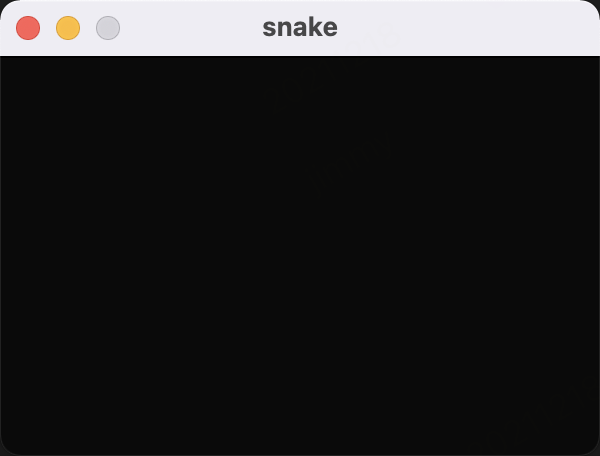
运行起来,就得到了1个黑背景的窗口应用程序。
二、加入蛇头&理解bevy的坐标系
use bevy::prelude::*;
use bevy_prototype_debug_lines::*; //<--
struct SnakeHead; //<--
struct Materials { //<--
head_material: Handle<ColorMaterial>, //<--
}
fn setup(mut commands: Commands, mut materials: ResMut<Assets<ColorMaterial>>) {
let mut camera = OrthographicCameraBundle::new_2d();
camera.transform = Transform::from_translation(Vec3::new(0.0, 0.0, 5.0));
commands.spawn_bundle(camera);
commands.insert_resource(Materials { //<--
head_material: materials.add(Color::rgb(0.7, 0.7, 0.7).into()),
});
}
fn spawn_snake(mut commands: Commands, materials: Res<Materials>) { //<--
commands
.spawn_bundle(SpriteBundle {
material: materials.head_material.clone(),
//生成1个30*30px大小的2d方块
sprite: Sprite::new(Vec2::new(30.0, 30.0)),
..Default::default()
})
.insert(SnakeHead);
}
fn draw_center_cross(windows: Res<Windows>, mut lines: ResMut<DebugLines>) { //<--
let window = windows.get_primary().unwrap();
let half_win_width = 0.5 * window.width();
let half_win_height = 0.5 * window.height();
//画横线
lines.line(
Vec3::new(-1. * half_win_width, 0., 0.0),
Vec3::new(half_win_width, 0., 0.0),
0.0,
);
//画竖线
lines.line(
Vec3::new(0., -1. * half_win_height, 0.0),
Vec3::new(0., half_win_height, 0.0),
0.0,
);
}
fn main() {
App::build()
.insert_resource(WindowDescriptor {
title: "snake".to_string(),
300.,
height: 200.,
resizable: false,
..Default::default()
})
.insert_resource(ClearColor(Color::rgb(0.04, 0.04, 0.04)))
.add_startup_system(setup.system())
.add_startup_stage("game_setup", SystemStage::single(spawn_snake.system())) // <--
.add_system(draw_center_cross.system())// <--
.add_plugins(DefaultPlugins)
.add_plugin(DebugLinesPlugin)// <--
.run();
}
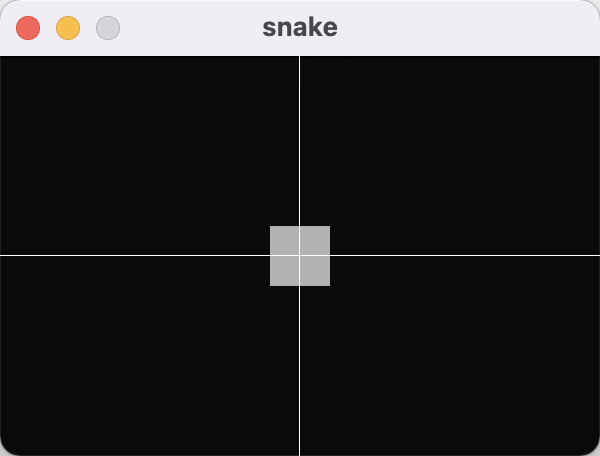
带<--的为新增部分,代码虽然看上去加了不少,但并不难理解,主要就是定义了1个方块充分蛇头,然后画了2根辅助线。从运行结果来看,屏幕中心就是bevy 坐标系的中心。
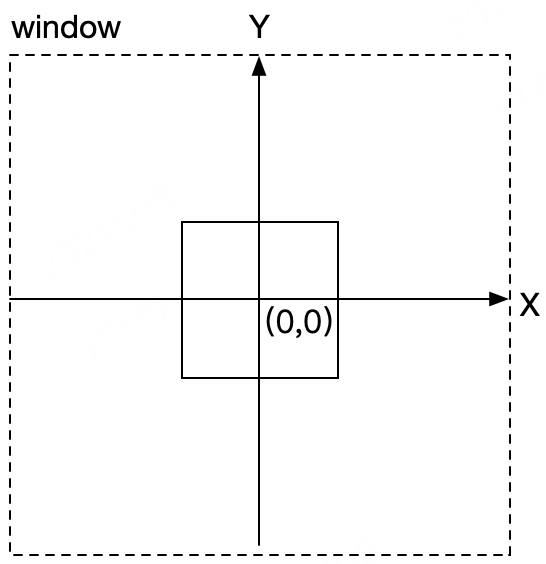
再加点运动效果:
fn snake_movement(windows: Res<Windows>, mut head_positions: Query<(&SnakeHead, &mut Transform)>) {
for (_head, mut transform) in head_positions.iter_mut() {
transform.translation.y += 1.;
let window = windows.get_primary().unwrap();
let half_win_height = 0.5 * window.height();
if (transform.translation.y > half_win_height + 15.) {
transform.translation.y = -1. * half_win_height - 15.;
}
}
}
...
.add_system(draw_center_cross.system())
.add_system(snake_movement.system()) // <--
.add_plugins(DefaultPlugins)
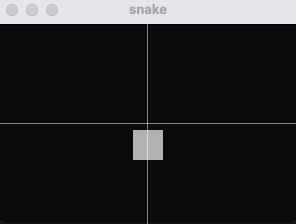
三、自定义网格坐标
贪吃蛇的游戏中,蛇头的移动往往是按一格格跳的,即相当于整个屏幕看成一个网络,蛇头每次移动一格。 先加一些相关定义:
//格子的数量(横向10等分,纵向10等分,即10*10的网格)
const CELL_X_COUNT: u32 = 10;
const CELL_Y_COUNT: u32 = 10;
/**
* 网格中的位置
*/
#[derive(Default, Copy, Clone, Eq, PartialEq, Hash)]
struct Position {
x: i32,
y: i32,
}
/**
* 蛇头在网格中的大小
*/
struct Size {
f32,
height: f32,
}
impl Size {
//贪吃蛇都是用方块,所以width/height均设置成x
pub fn square(x: f32) -> Self {
Self {
x,
height: x,
}
}
}
为了方便观察,在背景上画上网格线:
//画网格辅助线
fn draw_grid(windows: Res<Windows>, mut lines: ResMut<DebugLines>) {
let window = windows.get_primary().unwrap();
let half_win_width = 0.5 * window.width();
let half_win_height = 0.5 * window.height();
let x_space = window.width() / CELL_X_COUNT as f32;
let y_space = window.height() / CELL_Y_COUNT as f32;
let mut i = -1. * half_win_height;
while i < half_win_height {
lines.line(
Vec3::new(-1. * half_win_width, i, 0.0),
Vec3::new(half_win_width, i, 0.0),
0.0,
);
i += y_space;
}
i = -1. * half_win_width;
while i < half_win_width {
lines.line(
Vec3::new(i, -1. * half_win_height, 0.0),
Vec3::new(i, half_win_height, 0.0),
0.0,
);
i += x_space;
}
//画竖线
lines.line(
Vec3::new(0., -1. * half_win_height, 0.0),
Vec3::new(0., half_win_height, 0.0),
0.0,
);
}
蛇头初始化的地方,相应的调整一下:
fn spawn_snake(mut commands: Commands, materials: Res<Materials>) {
commands
.spawn_bundle(SpriteBundle {
material: materials.head_material.clone(),
//注:后面会根据网格大小,对方块进行缩放,所以这里的尺寸其实无效了,设置成0都行
sprite: Sprite::new(Vec2::new(30.0, 30.0)), // <--
..Default::default()
})
.insert(SnakeHead)
//放在第4行,第4列的位置
.insert(Position { x: 3, y: 3 }) // <--
//大小为网格的80%
.insert(Size::square(0.8)); // <--
}
另外把窗口大小调整成400*400 ,同时先注释掉方块运动相关的代码,跑一下看看网格线显示是否正常:
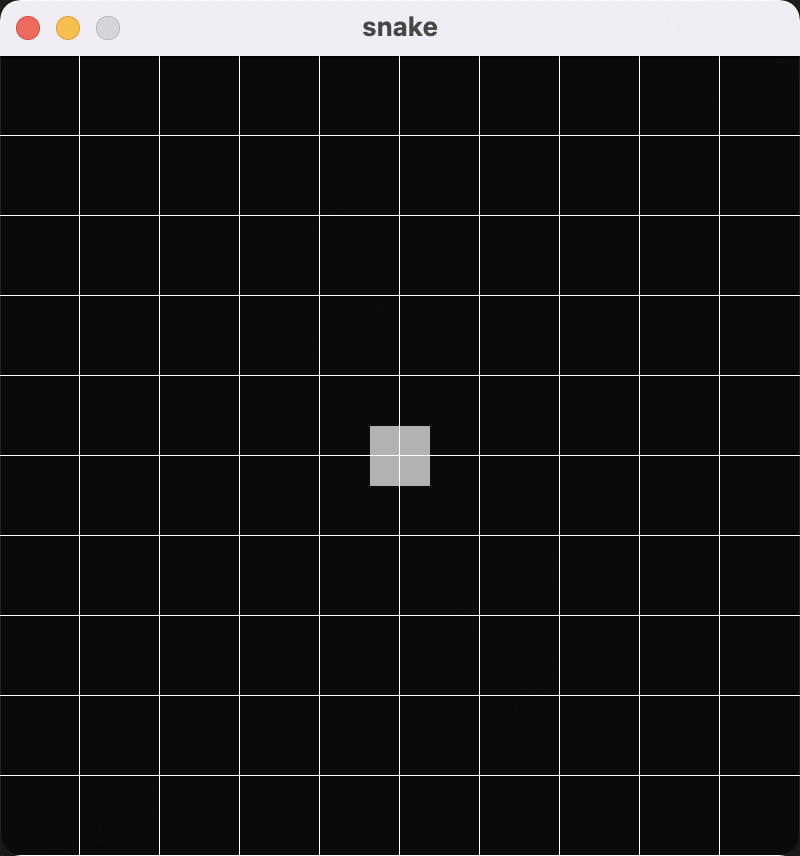
网络线是ok了,但是方块的大小和位置并无任何变化,接下来再写2个函数,来应用网格系统:
//根据网格大小,对方块尺寸进行缩放
fn size_scaling(windows: Res<Windows>, mut q: Query<(&Size, &mut Sprite)>) {
// <--
let window = windows.get_primary().unwrap();
for (sprite_size, mut sprite) in q.iter_mut() {
sprite.size = Vec2::new(
sprite_size.width * (window.width() as f32 / CELL_X_COUNT as f32),
sprite_size.height * (window.height() as f32 / CELL_Y_COUNT as f32),
);
}
}
/**
* 根据方块的position,将其放入适合的网格中
*/
fn position_translation(windows: Res<Windows>, mut q: Query<(&Position, &mut Transform)>) {
// <--
fn convert(pos: f32, window_size: f32, cell_count: f32) -> f32 {
//算出每1格的大小
let tile_size = window_size / cell_count;
//计算最终坐标值
pos * tile_size - 0.5 * window_size + 0.5 * tile_size
}
let window = windows.get_primary().unwrap();
for (pos, mut transform) in q.iter_mut() {
transform.translation = Vec3::new(
convert(pos.x as f32, window.width() as f32, CELL_X_COUNT as f32),
convert(pos.y as f32, window.height() as f32, CELL_Y_COUNT as f32),
0.0,
);
}
}
在main函数里,把这2个函数加进去
.add_system_set_to_stage( //<--
CoreStage::PostUpdate,
SystemSet::new()
.with_system(position_translation.system())
.with_system(size_scaling.system()),
)
.add_plugins(DefaultPlugins)
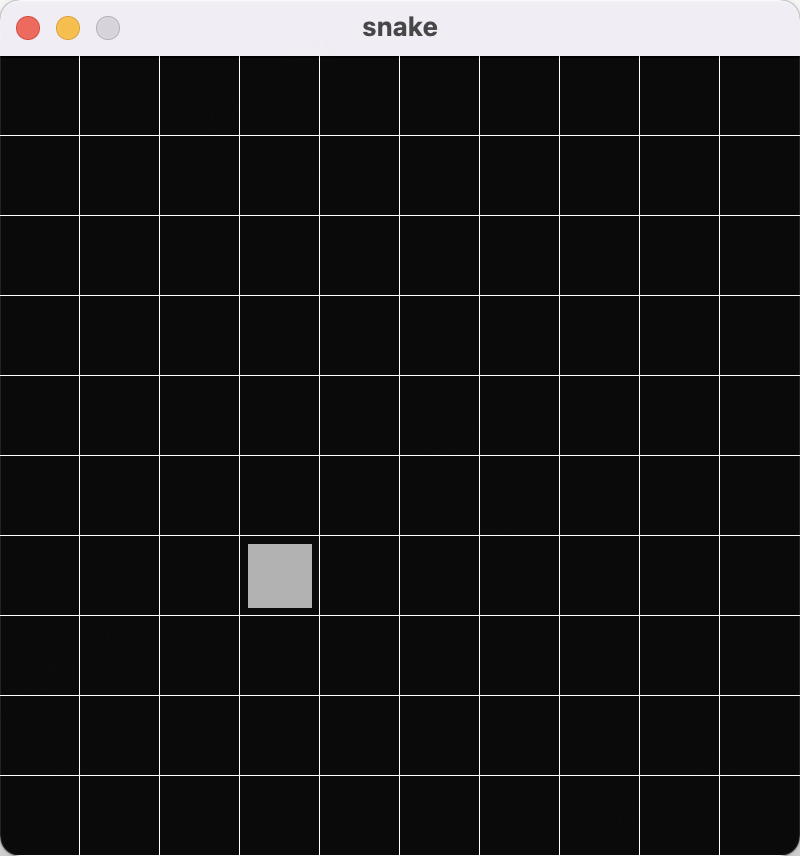
移动方块时,就不能再按像素来移动了,而是按单元格来移动
fn snake_movement(mut head_positions: Query<&mut Position, With<SnakeHead>>) {
for mut pos in head_positions.iter_mut() {
//每次向上移动1格
pos.y += 1;
if pos.y >= CELL_Y_COUNT as i32 {
pos.y = 0;
}
}
}
大多数游戏引擎,都有所谓帧数的概念,在我的mac上,1秒大概是60帧,窗口刷新非常快(注:因为gif录制软件的原因,实际运行起来比图片中还要快。)

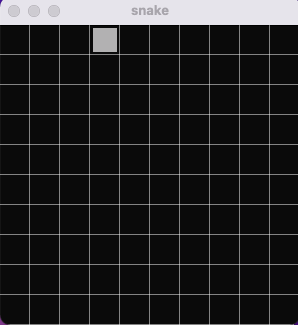
可以利用 FixedTimestep 把指定函数的执行速度调慢一些。
.add_system_set(// <--
SystemSet::new()
.with_run_criteria(FixedTimestep::step(1.0))
.with_system(snake_movement.system()),
)
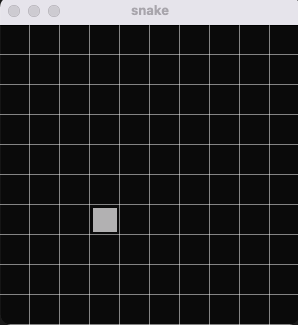
现在看上去好多了,最后再加入按键控制:
fn snake_movement( //<--
keyboard_input: Res<Input<KeyCode>>,
mut head_positions: Query<&mut Position, With<SnakeHead>>,
) {
for mut pos in head_positions.iter_mut() {
if keyboard_input.pressed(KeyCode::Left) {
if pos.x > 0 {
pos.x -= 1;
}
}
if keyboard_input.pressed(KeyCode::Right) {
if pos.x < CELL_X_COUNT as i32 - 1 {
pos.x += 1;
}
}
if keyboard_input.pressed(KeyCode::Down) {
if pos.y > 0 {
pos.y -= 1;
}
}
if keyboard_input.pressed(KeyCode::Up) {
if pos.y < CELL_Y_COUNT as i32 - 1 {
pos.y += 1;
}
}
}
}
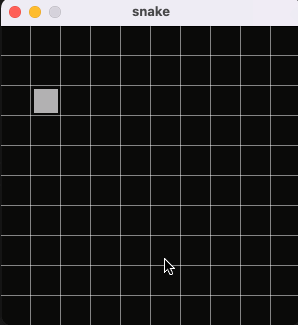
至此,main.rs的完整代码如下:
use bevy::core::FixedTimestep;
use bevy::prelude::*;
use bevy_prototype_debug_lines::*;
//格子的数量(横向10等分,纵向10等分,即10*10的网格)
const CELL_X_COUNT: u32 = 10;
const CELL_Y_COUNT: u32 = 10;
/**
* 网格中的位置
*/
#[derive(Default, Copy, Clone, Eq, PartialEq, Hash)]
struct Position {
x: i32,
y: i32,
}
/**
* 蛇头在网格中的大小
*/
struct Size {
f32,
height: f32,
}
impl Size {
//贪吃蛇都是用方块,所以width/height均设置成x
pub fn square(x: f32) -> Self {
Self {
x,
height: x,
}
}
}
struct SnakeHead;
struct Materials {
head_material: Handle<ColorMaterial>,
}
fn setup(mut commands: Commands, mut materials: ResMut<Assets<ColorMaterial>>) {
let mut camera = OrthographicCameraBundle::new_2d();
camera.transform = Transform::from_translation(Vec3::new(0.0, 0.0, 5.0));
commands.spawn_bundle(camera);
commands.insert_resource(Materials {
head_material: materials.add(Color::rgb(0.7, 0.7, 0.7).into()),
});
}
fn spawn_snake(mut commands: Commands, materials: Res<Materials>) {
commands
.spawn_bundle(SpriteBundle {
material: materials.head_material.clone(),
//注:后面会根据网格大小,对方块进行缩放,所以这里的尺寸其实无效了,设置成0都行
sprite: Sprite::new(Vec2::new(30.0, 30.0)), // <--
..Default::default()
})
.insert(SnakeHead)
//放在第4行,第4列的位置
.insert(Position { x: 3, y: 3 }) // <--
//大小为网格的80%
.insert(Size::square(0.8)); // <--
}
//根据网格大小,对方块尺寸进行缩放
fn size_scaling(windows: Res<Windows>, mut q: Query<(&Size, &mut Sprite)>) {
// <--
let window = windows.get_primary().unwrap();
for (sprite_size, mut sprite) in q.iter_mut() {
sprite.size = Vec2::new(
sprite_size.width * (window.width() as f32 / CELL_X_COUNT as f32),
sprite_size.height * (window.height() as f32 / CELL_Y_COUNT as f32),
);
}
}
/**
* 根据方块的position,将其放入适合的网格中
*/
fn position_translation(windows: Res<Windows>, mut q: Query<(&Position, &mut Transform)>) {
// <--
fn convert(pos: f32, window_size: f32, cell_count: f32) -> f32 {
//算出每1格的大小
let tile_size = window_size / cell_count;
//返回最终的坐标位置
pos * tile_size - 0.5 * window_size + 0.5 * tile_size
}
let window = windows.get_primary().unwrap();
for (pos, mut transform) in q.iter_mut() {
transform.translation = Vec3::new(
convert(pos.x as f32, window.width() as f32, CELL_X_COUNT as f32),
convert(pos.y as f32, window.height() as f32, CELL_Y_COUNT as f32),
0.0,
);
}
}
//画网格辅助线
fn draw_grid(windows: Res<Windows>, mut lines: ResMut<DebugLines>) {
// <--
let window = windows.get_primary().unwrap();
let half_win_width = 0.5 * window.width();
let half_win_height = 0.5 * window.height();
let x_space = window.width() / CELL_X_COUNT as f32;
let y_space = window.height() / CELL_Y_COUNT as f32;
let mut i = -1. * half_win_height;
while i < half_win_height {
lines.line(
Vec3::new(-1. * half_win_width, i, 0.0),
Vec3::new(half_win_width, i, 0.0),
0.0,
);
i += y_space;
}
i = -1. * half_win_width;
while i < half_win_width {
lines.line(
Vec3::new(i, -1. * half_win_height, 0.0),
Vec3::new(i, half_win_height, 0.0),
0.0,
);
i += x_space;
}
//画竖线
lines.line(
Vec3::new(0., -1. * half_win_height, 0.0),
Vec3::new(0., half_win_height, 0.0),
0.0,
);
}
fn snake_movement( //<--
keyboard_input: Res<Input<KeyCode>>,
mut head_positions: Query<&mut Position, With<SnakeHead>>,
) {
for mut pos in head_positions.iter_mut() {
if keyboard_input.pressed(KeyCode::Left) {
if pos.x > 0 {
pos.x -= 1;
}
}
if keyboard_input.pressed(KeyCode::Right) {
if pos.x < CELL_X_COUNT as i32 - 1 {
pos.x += 1;
}
}
if keyboard_input.pressed(KeyCode::Down) {
if pos.y > 0 {
pos.y -= 1;
}
}
if keyboard_input.pressed(KeyCode::Up) {
if pos.y < CELL_Y_COUNT as i32 - 1 {
pos.y += 1;
}
}
}
}
fn main() {
App::build()
.insert_resource(WindowDescriptor {
title: "snake".to_string(),
300.,
height: 300.,
resizable: false,
..Default::default()
})
.insert_resource(ClearColor(Color::rgb(0.04, 0.04, 0.04)))
.add_startup_system(setup.system())
.add_startup_stage("game_setup", SystemStage::single(spawn_snake.system()))
.add_system(draw_grid.system())
.add_system_set(
// <--
SystemSet::new()
.with_run_criteria(FixedTimestep::step(0.1))
.with_system(snake_movement.system()),
)
.add_system_set_to_stage(
// <--
CoreStage::PostUpdate,
SystemSet::new()
.with_system(position_translation.system())
.with_system(size_scaling.system()),
)
.add_plugins(DefaultPlugins)
.add_plugin(DebugLinesPlugin)
.run();
}
下一篇,我们将继续实现贪吃蛇的其它功能...
参考文章:
https://bevyengine.org/learn/book/getting-started/